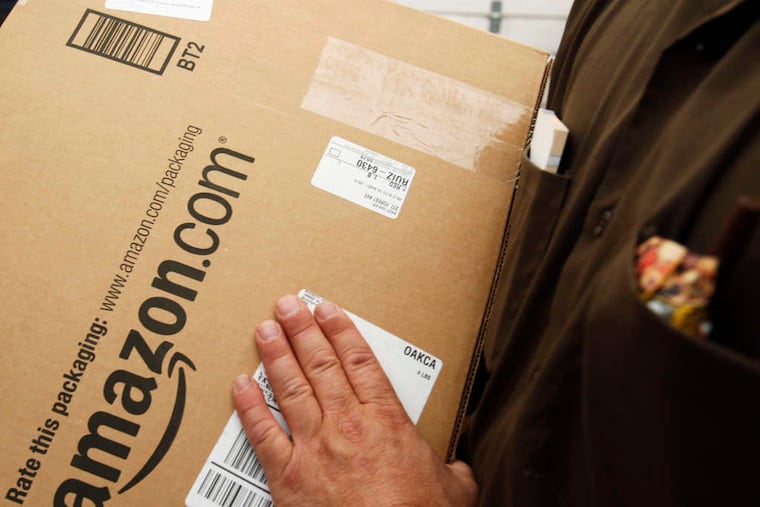Ordering your favorite stuff online? Pennsylvania, N.J. residents now owe sales tax.
What to do if you get a notice that you owe Pa. or N.J. sales tax.

Philadelphia resident Phil Handel ordered some sweet audio equipment from Crutchfield Corp. in Virginia.
Much later, he received a surprise — a notice that he owed more than $100 in sales tax.
“I got two letters in the mail, one from Gardener’s Supply in Vermont and the other from Crutchfield, which sells high-end audio equipment online. Both companies have been around for a long time. It was a strange letter, so I emailed Crutchfield, and they explained they’re required to do this now,” Handel said.
For years, online buyers have not paid sales tax in many states. But those days have ended in Pennsylvania and New Jersey, as a U.S. Supreme Court ruling allows states to collect sales tax from out-of-state sellers. That’s meant to eliminate any unfair advantage that online retailers like Amazon may have had over brick-and-mortar stores.
Handel paid roughly $1,300 for the audio equipment — and Crutchfield notified him to pay the Pennsylvania sales tax of 6 percent, plus an extra 2 percent because he lives in Philly. That’s $104 on top of the sales price, he estimated.
Online sellers are either charging sales tax themselves or reporting customers’ untaxed purchases to the state. Retailers with annual sales of more than $10,000 in Pennsylvania are now required to collect and remit sales tax. New Jersey has a similar rule for companies with sales totaling more than $100,000 or made in more than 200 transactions.
The 2018 Supreme Court case, South Dakota v. Wayfair, overturned a longstanding “physical presence” rule and gave states authority to impose sales tax on out-of-state sellers, said Cynthia Ragen, tax manager with Isdaner & Co. in Bala Cynwyd. The decision had far-reaching implications for online sellers as well as brick-and-mortar businesses shipping to other states.
Because Crutchfield had not collected sales tax from Handel, the company wrote to him saying he owed the amount to Pennsylvania. Starting July 1, Crutchfield will be required to collect sales tax from customers and hand it over to the state. Until then, the company plans to tell customers to pay the state directly.
“This has been a complicated process, as each state has their own rules by which we must comply,” Crutchfield told Handel in an email.
Foreign companies are responsible, too. Non-U.S. online retailers that sell to customers in America must collect and remit state sales tax if they meet the economic thresholds.
“Pennsylvania passed its own ‘economic nexus’ rule, and so did New Jersey,” Ragen said. “It was targeted at Amazon and eBay, Zappos, and Etsy sellers, to make an even playing field" for smaller businesses. Her clients are starting to receive letters as well. “We knew it was coming,” she added.
Will consumers’ buying habits change? “Might Pennsylvania residents who live near Delaware, especially Philadelphia residents who would be subject to an 8 percent sales tax rate, be motivated to do more shopping in Delaware, the self-proclaimed ‘home of tax-free shopping,’ rather than shop online?” wrote two attorneys with Grant Thornton on the website PICPA.org, a blog for local accountants.
Handel said he’s paying the tax through his TurboTax accounting software.
“I know a lot of people always ignored it, but now we can’t," he said, "because the companies are reporting these sales to the states.”
If you owe sales tax
What should you do if you receive a letter from an online retailer? Don’t panic; you’ll likely be able to pay up at tax time.
For purchases, enter the amount owed on Pennsylvania state tax forms when you file and the money owed will go to the Department of Revenue, Ragen said.
At this point, 32 states have set thresholds, meaning sellers don’t have to have a physical presence in the state, merely a sales presence.
If you receive a notice, or have questions on how to report, contact the Department of Revenue’s Bureau of Enforcement Planning, Analysis and Discovery at 717-214-7287.
The Department of Revenue has an explanation on its website for those who have received sales tax notice from retailers.
New Jersey passed a similar law that went into effect on Nov. 1, 2018. Tax rates vary depending on what you purchased. Additional information is available on New Jersey’s Treasury website.